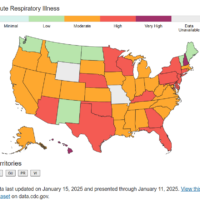Gov. Andy Beshear spoke directly to Christian countians Friday afternoon during his daily briefly on the state’s efforts to curb COVID-19.

“If you are a Kentuckian living on that border, I need you to not go to Tennessee for anything other than work or helping a loved one, or maybe the grocery if it is closer,” Beshear said in a message to residents who might be tempted to find services across the state line that have been shut down in Kentucky.
Tennessee Gov. Bill Lee has declined to order some of the types of business closures now in effect in Kentucky and other states that border Kentucky.
Beshear mentioned Christian, Todd and Logan counties specifically when he spoke about problems that could result from Kentuckians going into Tennessee during the coronavirus outbreak.
If Kentucky residents living along the border go into Tennessee to patronize restaurants and hair salons, they could become infected with the coronavirus and bring it back into Kentucky and potentially sicken themselves, their families and their neighbors.
In several Tennessee counties along the Kentucky border, the rate of infection is higher than it is in the neighboring Kentucky counties, Beshear noted.
There were nine confirmed cases in Montgomery County on Friday. Robertson County reported 22. By comparison, Christian County has five confirmed cases, although more than 200 test results are pending from specimens taken at Jennie Stuart Medical Center and its Express Lab.
During the coronavirus outbreak, Beshear has suspended dine-in business for bars and restaurants. He’s also ordered nonessential retail businesses, such as clothing stores, too close. Public-facing businesses, including hair salons, are also closed. Public gatherings of 10 or more people are prohibited. That applies to in-person worship at churches.
Tennessee does not have the same statewide closures, although some cities, including Nashville, have restricted public access to restaurants and bars.
Beshear said he did not intend to critique Lee.
“I’m just here trying to protect my people,” he said. “I just want to make sure that all of our surrounding neighbors are doing everything that they can because it gives us an extra level of protection.”
A large number of Tennessee physicians and others have called on Lee to issue a statewide stay-at-home order in their state.
Lee responded, “We are encouraging people to stay at home at every turn. You can’t get into people’s homes and find out what kind of behavior they’re having, but we certainly can encourage them to do it. We can through every opportunity we have, through public service announcements, through stay-at-home restrictions that we have in our major cities across the state and other areas in Tennessee.”
(Jennifer P. Brown is the editor and founder of Hoptown Chronicle. Reach her at editor@hoptownchronicle.org.)
Jennifer P. Brown is co-founder, publisher and editor of Hoptown Chronicle. You can reach her at editor@hoptownchronicle.org. Brown was a reporter and editor at the Kentucky New Era, where she worked for 30 years. She is a co-chair of the national advisory board to the Institute for Rural Journalism and Community Issues, governing board past president for the Kentucky Historical Society, and co-founder of the Kentucky Open Government Coalition. She serves on the Hopkinsville History Foundation's board.





